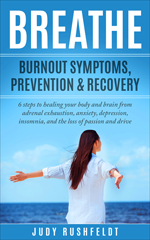Mental Health - Articles
Chronic Stress & Depression
by Judy Rushfeldt, award-winning author and publisher of DepressionFree.com
Some stress is good for you. It motivates you to achieve a goal and embrace new challenges.
But too much negative stress can kill you. Literally. When the stresses are constant and intense, and you don’t give yourself adequate time to recover -- your body and brain pay the price.
Chronic stress may be the number one cause of depressed and anxious moods among adults. It is also the number one preventable cause of serious illnesses such as stroke and heart disease.
The cumulative effect of chronic stress is called “stress sensitization.”
Little by little, biochemical changes exhaust your adrenal glands and other hormones involved in the body’s stress response. Eventually, your body and brain react to minor everyday stresses the same way they would have responded to a major stress in the past. You might be running late for a meeting, but your body and brain react as if you were experiencing a major crisis.
Do you find yourself thinking: “Why do I get tired so easily? Why am I feeling so overwhelmed – this is really not a big deal. Why am I getting sick so often? Why does it take so little to make me irritable, or anxious and depressed? What’s changed?”
Read about chronic stress and depression and how to recover
Judy's lates book, BREATHE: Burnout Symptoms, Prevention & Recovery is now available on Amazon
For more information or to purchse, click here

FDA approves magnetic helmet that "rewires" the brain
The U.S. Food and Drug Administration approved a helmet using magnets to treat depression in patients who have failed to respond to antidepressant medications.
Transcranial magnetic stimulation (TMS) is a noninvasive technique that applies brief magnetic pulses to the brain, enabling direct non-invasive activation of deep brain structures, essentially “re-wiring” specific neural pathways. TMS works by energizing nerve tracks in the brain by making them fire more frequently. The initial course of treatment consists of five sessions a week over four to six weeks. Patients remain awake during the treatment.
The treatment has no significant side effects, no systemic effect (in contrast to drugs), and no need of hospitalization or anesthesia. The device has been used in Europe for years for treating clinical depression, bipolar disorder, schizophrenia, Parkinson’s disease, and PTSD.
For more information, visit Brainsway.com
Drug-proof your kids... before it's too late
Suicide is the third-leading cause of death among adolescents. More than 90% of suicide victims were depressed, and many of the adolescents also used drugs. Do drugs cause depression? Or does depression lead to drug use? What can you do to protect your children?
Read more
|



